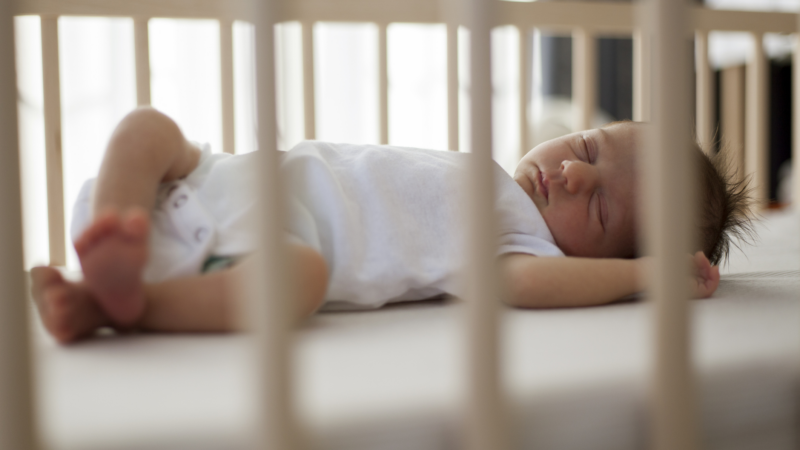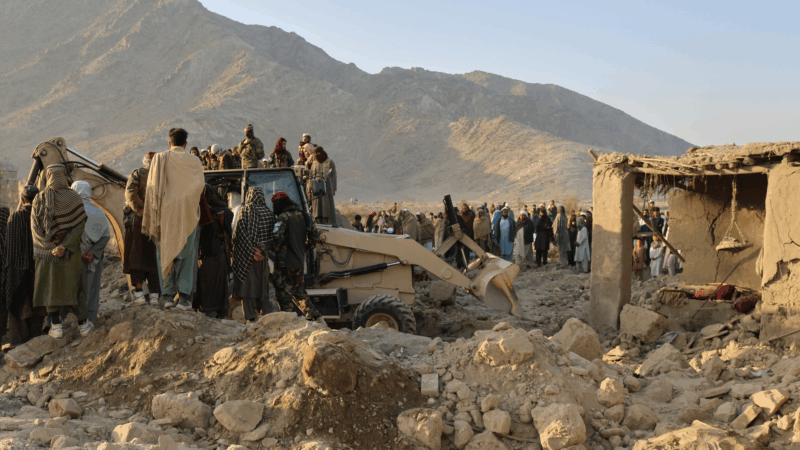NIH cuts baby ‘Safe to Sleep’ team. Here’s what parents should know
I still remember how, as a new parent, I would often tiptoe into my sleeping son’s room multiple times a day — and night — to make sure he was still breathing.
Thanks to Safe to Sleep, a public awareness campaign launched three decades ago, I knew that sleep-related infant deaths were a leading cause of deaths for babies in the U.S.
The federal government launched the campaign as ‘Back to Sleep’ in 1994 in partnership with private organizations. Since then, it has helped save thousands of babies from dying in their sleep, says Dr. Rachel Moon, a pediatrician and researcher at the University of Virginia who helped write the American Academy of Pediatrics’ guidelines on safe infant sleep.
“At the very beginning of Back to Sleep, the number of deaths decreased by 50%, which is huge,” Moon says.
But now, the Trump administration has shut down the office responsible for leading that campaign, now known as Safe to Sleep.
Safe sleep recommendations for babies include laying them down on their back instead of their stomachs on a firm mattress in their own space, like a crib or bassinet. Avoid sleeping with an infant on a couch or armchair or in a swing or car seat except if they’re in a vehicle. And keep loose blankets, pillows, crib bumpers and other soft items out of their sleep area to avoid the risk of suffocation or strangulation. Unintentional suffocation is the leading cause of injury death among infants who are less than 12 months old.
Safe to Sleep created the public health messaging for this information and distributed it on social media, as well as in pamphlets targeted to specific groups, such as grandparents, and translated it into different languages. It also provided the materials to hospitals and doctors’ offices to be handed out to patients.
All of this material was produced and distributed by the office of communications at the Eunice Kennedy Shriver National Institute of Child Health and Human Development. Shriver was the aunt of current health secretary Robert F Kennedy Jr. As first reported by STAT News, that entire department was terminated on April 1. Moon’s contact at the office emailed her to share the news.
“They sent an email saying ‘just wanted to let you know that since the office has been terminated, so has Safe to Sleep’. And that was it,” says Moon, who collaborated on the campaign.
Moon says she was shocked. “For this to be pulled without any notice and, you know, at a time when these deaths are increasing — is devastating, frankly.”
After holding steady for years, sleep-related infant deaths rose by nearly 12 percent between 2020 and 2022, according to the most recent data. Researchers think the rise may be related to parents not getting the information on safe sleep they needed during the pandemic, when access to health care might have been more limited.
Alison Jacobson is with First Candle, a nonprofit that has participated in the Safe to Sleep campaign since it began. She says the group will continue its efforts to educate parents on safe sleep recommendations, but it doesn’t have anywhere near the funding needed to replace the resources that the NIH provided.
“State agencies, departments of health, hospitals would reach out to them and ask for all of these free resources to be sent to them, which they were able to do,” Jacobson says. “We don’t have the ability to do that.”
NPR reached out to the National Institutes of Health for comment. In an email, the agency said “no final decision has been made regarding the future of the Safe to Sleep campaign.” The email said the campaign materials remain available online.
When I went on to the Safe to Sleep website, the pamphlets and other materials could be still downloaded, but many were listed as temporarily unavailable for order.
Christina Stile is the former deputy director for the NICHD communications office that has been cut. She says the office used to distribute millions of publications each year.
“It’s possible that someone at NIH could take this over,” she says. But with many of the communications offices at NIH’s various institutes reportedly affected by widespread job cuts, “I don’t know who would do it.”
Jacobson says she’s all too familiar with what can happen when parents don’t get the safe sleep information they need. She says she’s often heard this in conversations at First Candle’s bereavement support services.
“I can’t tell you how many times it breaks my heart when we have parents in the group saying, ‘Nobody told me’ or ‘I didn’t know. I didn’t know I couldn’t have a blanket in the crib. I didn’t know about anything.’ “
She worries that going forward, it’s going to be that much harder to get information out to help parents keep their babies safe.
Edited by Jane Greenhalgh
University students hold new protests in Iran around memorials for those killed
Iran's state news agency said students protested at five universities in the capital, Tehran, and one in the city of Mashhad on Sunday.
Pakistan claims to have killed at least 70 militants in strikes along Afghan border
Pakistan's military killed at least 70 militants in strikes along the border with Afghanistan early Sunday, the deputy interior minister said.
Team USA faces tough Canadian squad in Olympic gold medal hockey game
In the first Olympics with stars of the NHL competing in over a decade, a talent-packed Team USA faces a tough test against Canada.
PHOTOS: Your car has a lot to say about who you are
Photographer Martin Roemer visited 22 countries — from the U.S. to Senegal to India — to show how our identities are connected to our mode of transportation.
Looking for life purpose? Start with building social ties
Research shows that having a sense of purpose can lower stress levels and boost our mental health. Finding meaning may not have to be an ambitious project.
Sunday Puzzle: TransformeR
NPR's Ayesha Rascoe plays the puzzle with listener Joan Suits and Weekend Edition Puzzlemaster Will Shortz.






